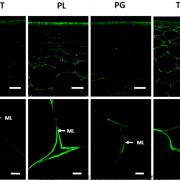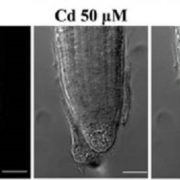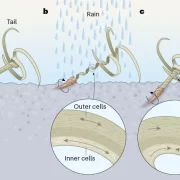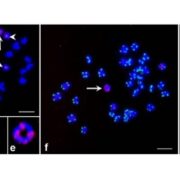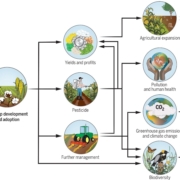Greatly enhanced removal of volatile organic carcinogens by a genetically modified houseplant ($)
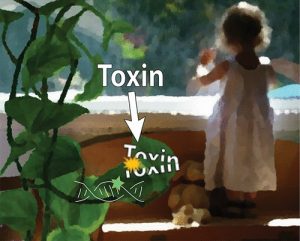 Plants provide us with food, fiber, shelter, medicine, and fuel. In the process, they also release the oxygen that we breathe. Now, they can also help remove carcinogens from our homes. Zhang et al., have developed a genetically modified a common houseplant, Epipremnum aureum, pothos ivy, that can remove chloroform and benzene from the air around it. These biofilter plants which are easy to grow at home have been transformed with synthetic mammalian cytochrome P450 2e1, a protein that is present in all mammals. In humans, this protein functions in our livers to remove toxins when they are present, but here, the authors have constitutively expressed the rabbit 2e1 in pothos ivy to constantly remove pollutants from surrounding air. To test how well the modified plants work, they were placed in glass tubes with high concentrations of benzene and chloroform. After 3 days, the concentration of chloroform dropped by 82 percent, and it was almost undetectable by day six. Wild-type plants under the same conditions did not show significantly reduced levels of these pollutants. This transgenic method would require little energy beyond that used to provide air circulation and could be a very sustainable phytoremediation solution. (Summary by Katie Rogers) Environ. Sci. Technol. 10.1021/acs.est.8b04811
Plants provide us with food, fiber, shelter, medicine, and fuel. In the process, they also release the oxygen that we breathe. Now, they can also help remove carcinogens from our homes. Zhang et al., have developed a genetically modified a common houseplant, Epipremnum aureum, pothos ivy, that can remove chloroform and benzene from the air around it. These biofilter plants which are easy to grow at home have been transformed with synthetic mammalian cytochrome P450 2e1, a protein that is present in all mammals. In humans, this protein functions in our livers to remove toxins when they are present, but here, the authors have constitutively expressed the rabbit 2e1 in pothos ivy to constantly remove pollutants from surrounding air. To test how well the modified plants work, they were placed in glass tubes with high concentrations of benzene and chloroform. After 3 days, the concentration of chloroform dropped by 82 percent, and it was almost undetectable by day six. Wild-type plants under the same conditions did not show significantly reduced levels of these pollutants. This transgenic method would require little energy beyond that used to provide air circulation and could be a very sustainable phytoremediation solution. (Summary by Katie Rogers) Environ. Sci. Technol. 10.1021/acs.est.8b04811


